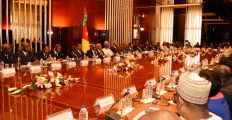Categories
Recent Posts
- Race for the Unity Palace: Kamto’s strategy sparks clash ahead of election
- CEMAC introduces new coins, including a CFA200 piece
- Football: Real Madrid manager Ancelotti testifies in court over tax charges
- Manyu Division: Ma Nchong Stella is the new Ekandim Nkanda of Ntenako
- CPDM Crime Syndicate: Biya’s acolytes expected to fill bureau vacancies
Archives
- April 2025
- March 2025
- February 2025
- January 2025
- December 2024
- November 2024
- October 2024
- September 2024
- August 2024
- July 2024
- June 2024
- May 2024
- April 2024
- March 2024
- February 2024
- January 2024
- December 2023
- November 2023
- October 2023
- September 2023
- August 2023
- July 2023
- June 2023
- May 2023
- April 2023
- March 2023
- February 2023
- January 2023
- December 2022
- November 2022
- October 2022
- September 2022
- August 2022
- July 2022
- June 2022
- May 2022
- April 2022
- March 2022
- February 2022
- January 2022
- December 2021
- November 2021
- October 2021
- September 2021
- August 2021
- July 2021
- June 2021
- May 2021
- April 2021
- March 2021
- February 2021
- January 2021
- December 2020
- November 2020
- October 2020
- September 2020
- August 2020
- July 2020
- June 2020
- May 2020
- April 2020
- March 2020
- February 2020
- January 2020
- December 2019
- November 2019
- October 2019
- September 2019
- August 2019
- July 2019
- June 2019
- May 2019
- April 2019
- March 2019
- February 2019
- January 2019
- December 2018
- November 2018
- October 2018
- September 2018
- August 2018
- July 2018
- June 2018
- May 2018
- April 2018
- March 2018
- February 2018
- January 2018
- December 2017
- November 2017
- October 2017
- September 2017
- August 2017
- July 2017
- June 2017
- May 2017
- April 2017
- March 2017
- February 2017
- January 2017
- December 2016
- November 2016
- October 2016
- September 2016
- August 2016
- July 2016
- June 2016
Featured
Most Commented Posts
 4 Anglophone detainees killed in Yaounde
4 Anglophone detainees killed in Yaounde
18 comments Chantal Biya says she will return to Cameroon if General Ivo Yenwo, Martin Belinga Eboutou and Ferdinand Ngoh Ngoh are sacked
Chantal Biya says she will return to Cameroon if General Ivo Yenwo, Martin Belinga Eboutou and Ferdinand Ngoh Ngoh are sacked
13 comments The Anglophone Problem – When Facts don’t Lie
The Anglophone Problem – When Facts don’t Lie
12 comments Anglophone Nationalism: Barrister Eyambe says “hidden plans are at work”
Anglophone Nationalism: Barrister Eyambe says “hidden plans are at work”
12 comments Largest wave of arrest by BIR in Bamenda
Largest wave of arrest by BIR in Bamenda
10 comments
Latest Tweets
Featured
-

Race for the Unity Palace: Kamto’s strategy sparks clash ahead of election
-

CEMAC introduces new coins, including a CFA200 piece
-

Football: Real Madrid manager Ancelotti testifies in court over tax charges
-

Manyu Division: Ma Nchong Stella is the new Ekandim Nkanda of Ntenako
-

CPDM Crime Syndicate: Biya’s acolytes expected to fill bureau vacancies
-

Yaoundé spent CFA311bn on interest payments for central government debt in 2024
-

President Putin begins biggest Russian military call-up in years
© Cameroon Concord News 2025





8, August 2024
World Bank urges Biya regime to enhance tax collection 0
Cameroon, Central Africa’s second-largest economy, needs to strengthen its tax collection and improve public spending efficiency to boost economic growth, according to the World Bank.
Despite reducing its fiscal deficit by approximately 5 percentage points over six years to just 1.1% of GDP in 2022, largely through cuts in public investment, the World Bank emphasizes that targeted spending is crucial for sustainable growth.
“Cameroon’s fiscal consolidation was expenditure-driven, leading to low levels of public spending that hinder the provision of adequate services and infrastructure investment,” the World Bank noted in a recent report.
To enhance its economic performance, Cameroon needs a medium-term revenue strategy focused on more effective tax collection and improved allocation of resources. Social sectors like health and education have been particularly impacted by under-investment and inefficiencies.
The report also highlights the need to diversify revenue sources, as direct taxation remains low and stagnant. Cameroon’s reliance on value-added tax is compounded by underperforming international trade taxes and levies on property and forests, which cover a third of the country’s territory.
Amid rising global interest rates, borrowing costs in dollars have increased, forcing many governments to seek domestic solutions. However, Cameroon recently secured $550 million through a dollar bond sale with a yield of 10.75%, indicating an urgent need for financing despite challenging conditions.
Cameroon has faced numerous crises, including the impacts of the Covid-19 pandemic and Russia’s invasion of Ukraine. Additionally, internal conflicts have exacerbated poverty in various regions, and a decline in crude oil production has strained government revenue.
Nonetheless, the International Monetary Fund anticipates growth to accelerate from 3.3% in 2023 to 3.9% in 2024, despite a tense political atmosphere. The 91-year-old President Paul Biya, who has ruled for nearly 42 years, is expected to seek re-election in the upcoming February presidential polls, amidst increasing political repression.
Source: Bloomberg